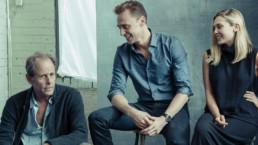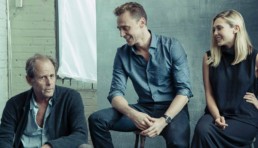Tom Hiddleston, Elizabeth Olsen, and Director Marc Abraham On ‘I Saw the Light’
This is a custom heading element.
[soundcloud url=”https://api.soundcloud.com/tracks/254333941″ params=”color=ff5500&auto_play=false&hide_related=false&show_comments=true&show_user=true&show_reposts=false” width=”100%” height=”166″ iframe=”true” /]
Tom Hiddleston, Elizabeth Olsen, and director/writer/producer Marc Abraham take their seats at The London Hotel in West Hollywood, where we are all about to begin the long-awaited press conference for the new Hank Williams biopic, “I Saw The Light.” The film, which was originally set to release in November of last year, is finally making its way to a limited theatrical release this Friday, with a nationwide roll-out April 1st. Hiddleston, the tall, handsome British actor, best known for his role as ‘Loki’ in the Marvel Cinematic Universe, talks about transforming into an American-folk icon, while Olsen talks about leaving her own Marvel characters behind to “bleed into” the role of ‘Audrey Williams’. We begin:
Would you say “I Saw The Light” changed your perspective of country music in America?
Tom Hiddleston: Yes it has. What I find interesting about American country music is that it’s an expression of the authentic soul of the country. When you get under the skin of a country’s folk music, you start to understand their instinctive rhythm. When I went to Nashville and spent some time preparing for this I started to understand that country music is America’s folk music that comes from the blues. That gave me a whole new appreciation for it, which has been really thrilling.
What was the most difficult song for you to perform?
TH: Probably ‘Lovesick Blues’. Of all the songs Hank sang, he probably sang that the most. It’s a very technically difficult song with all the yodeling and jumping octaves and to be on-pitch with every note was really challenging. We had to pre-record certain tracks because of the way we were going to shoot the film. They each had to have a certain atmosphere because some of them were radio station tracks, some were in-studio and others were live performances. Some came very quickly and easily to me, and others didn’t. I recorded ‘Why Don’t You Love Me‘ in an hour. It took me about 10 days to record ‘Lovesick Blues’.
Marc Abraham: From the moment I wrote the script and decided to make the movie, I was intent that we would not be lip-synching [to Hank Williams] in the film. Whoever would play the part would have to sing it. Tom and I both knew from the very beginning that he would never sound exactly like Hank Williams, but what Tom was able to do was inhabit the character so that in the end, it didn’t matter that he didn’t sound exactly like Hank Williams. What we wanted was for you to feel like he was Hank Williams.

Audrey obviously craved the spotlight herself, can you talk about getting into that character?
Elizabeth Olsen: The thing I kept trying to fight Marc on was all of her lines wanting to sing with him, I was like, ‘It just makes her sound so awful.’ The truth is after Hank passed away, she still worked at it. She put her kids and herself onstage and there are videos of her on YouTube still singing, so I had to just embrace it even though it’s an unlikeable characteristic.
How did you bring authenticity to the roles of Hank and Audrey?
EO: It’s two-fold playing someone who really existed; you have a lot of responsibility and you’re also trying to create more of a three-dimensional person than what the legacy or stories have. You also have the gift of a lot of additional source material. [As an actor], you start there, with the photographs, the personal belongings, books, documentaries. Then there comes a point where you’ve done all your work and it’s time to bleed into the character.
TH: The most fascinating thing about acting is finding the common ground between yourself and the character, and that becomes even more fascinating when the character is so far away from you as Hank was for me. I made all the physical changes- like how I looked and the way I sounded- but at a certain point, the challenge is to commit yourself to experiencing the intensity of his emotional life. That is the actor’s duty, and the fun part.
MA: For me, what’s authentic is who the people really are, and what that requires is finding someone, in this case, Tom and Lizzie. You have to believe that inside them is the ability to actually become that person. They’re never going to become the exact person, they’re going to become the version of the person that they best believe in. I didn’t want to make a movie about when he was born or where he learned how to play the guitar, I wanted to get to the human condition and that’s what Elizabeth and Tom brought.

If you could each take home a costume piece or a prop, what would it be?
EO: I had a blue and brown dress I really liked, there is no significance behind it aside from I thought it looked good on me, haha!
TH: I played some beautiful guitars. And also (points to poster) these boots are the real deal. They were made especially for me and every time I wore them I was like ‘These are shit kickers’ these things, they were great.
(Laughter)
MA: Actually the costumes will be shown at the Autry Museum soon, they loved the costumes so much they asked to exhibit the costumes at their grand opening.
As much as Hank Williams and his music are a part of Americana history, so are the clothes. How important were the costumes and their authenticity to the film?
MA: What we tried to do with Elizabeth and Tom, and this was really important to me in the movie, is that these people weren’t the same people when they were not on stage. When we didn’t see Audrey or Tom on stage, we saw them how they normally dressed, and that they weren’t a bunch of hillbillies. They were real people who didn’t wear a ton of different clothes. Hank always had a hat on, Audrey had a good sense of style. The subtlety of if was really important. So, yes, those costumes that we put on stage were really important to get completely right, but when they were offstage in their real lives, it was just as important that they weren’t always dressed up.
TH: When you put those costumes on you just feel different. It’s just like what Marc was talking about- the difference between the public persona of the performer and the private identity of the man.

Tom, is it true you met with Hank Williams’ family?
TH: On the set I met Jett Williams who is the daughter of Hank and Bobbie Jett. There is a scene in the film where Bobbie tells Hank she’s pregnant with his child and Jett was born four days after Hank died. Jett never met her father. She had a complicated history where she never knew she was Hank’s daughter until she was quite older. The day she came on set, I was able to spend an extended lunch with Jett and she said it was like looking at a ghost. It was a couple of hours of accelerated intimacy because I had spent months immersing myself into the life of her father.
Tom and Lizzie, you both have experience doing blockbuster Marvel films. Do you find it refreshing to play a role that’s based on a true story?
EO: There’s a lot of original source material in the Marvel land!
(Laughter)
TH: The interesting thing about this question is that I think for the audience, the difference is greater than for actors. Our job, our obligation and our duty is to step into characters and play them truthfully, whether that’s a Norse god of mischief or a real-life American icon. In terms of that commitment of empathy and psychological excavation, to me there is actually no difference – I’m flexing the same dramatic muscle. Of course, it’s different in process. We were able to inhabit locations without any sort of green screen or special effects, so in that regard it’s different.
EO: I agree that the way you approach characters is different, but for me it is a breath of fresh air to be on an intimate set and have momentum and to not wait around in a trailer for six hours and then you have 30 seconds to save the world in one look. That’s a lot of pressure!

Morgan Rojas
Certified fresh. For disclosure purposes, Morgan currently runs PR at PRETTYBIRD and Ventureland.


